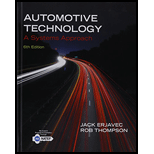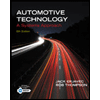
Bundle: Automotive Technology: A Systems Approach, 6th + LMS Integrated for MindTap Auto Trades Printed Access Card
6th Edition
ISBN: 9781305366749
Author: Jack Erjavec, Rob Thompson
Publisher: Cengage Learning
expand_more
expand_more
format_list_bulleted
Textbook Question
Chapter 32, Problem 12RQ
Ten psi of turbo boost means that air is being fed into the engine at_______ when the engine is operating at sea level.
a. 4.7 psia
b. 10 psia
c. 14.7 psia
d. 24.7 psia
Expert Solution & Answer
Trending nowThis is a popular solution!

Students have asked these similar questions
4-105. Replace the force system acting on the beam by an equivalent resultant force and couple
moment at point B.
A
30 in.
4 in.
12 in.
16 in.
B
30%
3 in.
10 in.
250 lb
260 lb
13
5
12
300 lb
Sketch and Describe a hatch coaming and show how the hatch coamings are framed in to ships strucure?
Sketch and describe hatch coamings. Describe structrual requirements to deck plating to compensate discontinuity for corners of a hatch. Show what is done to the deck plating when the decks are cut away and include the supporting members.
Chapter 32 Solutions
Bundle: Automotive Technology: A Systems Approach, 6th + LMS Integrated for MindTap Auto Trades Printed Access Card
Ch. 32 - What is the difference between psia and psig...Ch. 32 - What can be used to check for a restricted exhaust...Ch. 32 - A mini-converter is used _____. a. on small...Ch. 32 - True or False? Engine misfires can cause a...Ch. 32 - What is acoustic supercharging?Ch. 32 - Describe the basic operation of an intake manifold...Ch. 32 - Prob. 7RQCh. 32 - True or False? All wastegates are controlled by...Ch. 32 - Prob. 9RQCh. 32 - A restricted exhaust system can cause______. a....
Ch. 32 - Which of the following is not characteristic of a...Ch. 32 - Ten psi of turbo boost means that air is being fed...Ch. 32 - What manages turbo output by controlling the...Ch. 32 - What is the first step in turbocharger inspection?...Ch. 32 - Prob. 15RQCh. 32 - Technician A says that a turbocharger has its own...Ch. 32 - Technician A makes sure that the exhaust system is...Ch. 32 - Technician A says vacuum refers to any pressure...Ch. 32 - Technician A uses sandpaper to remove carbon...Ch. 32 - Technician A says that a vacuum leak results in...Ch. 32 - Technician A says that vacuum hose routing for the...Ch. 32 - Before replacing any exhaust system component:...Ch. 32 - A vehicles intake manifold is warped: Technician A...Ch. 32 - Technician A says that the catalytic converter is...Ch. 32 - Technician A says that the exhaust manifold gasket...
Knowledge Booster
Learn more about
Need a deep-dive on the concept behind this application? Look no further. Learn more about this topic, mechanical-engineering and related others by exploring similar questions and additional content below.Similar questions
- An Inclining experiment done on a ship thats 6500 t, a mass of 30t was moved 6.0 m transvesly causing a 30 cm deflection in a 6m pendulum, calculate the transverse meta centre height.arrow_forwarda ship 150 m long and 20.5 m beam floats at a draught of8 m and displaces 19 500 tonne. The TPC is 26.5 and midshipsection area coefficient 0.94. Calculate the block, prismatic andwaterplane area coefficients.arrow_forwardA vessel loads 680 t fuel between forward and aft deep tanks. centre of gravity of forward tank is 24m forward of ships COG. centre to centre between tanks is 42 m. how much in each tank to keep trim the samearrow_forward
- Beam of a vessel is 11% its length. Cw =0.72. When floating in SW of relative denisity 1.03, TPC is 0.35t greater than in freshwater. Find the length of the shiparrow_forwardAn inclining experiment was carried out on a ship of 4000tonne displacement, when masses of 6 tonne were moved transverselythrough 13.5 m. The deflections of a 7.5 m pendulurnwere 81, 78, 85, 83, 79, 82, 84 and 80 mm respectively.Caiculate the metacentric height.arrow_forwardA ship of 10 000 tonne displacement has a waterplanearea of 1300 m2. The ship loads in water of 1.010 t/m3 andmoves into water of 1.026 t/m3. Find the change in meandraughtarrow_forward
- A ship of 7000 tonne displacement has a waterplane areaof 1500 m2. In passing from sea water into river water of1005 kg/m3 there is an increase in draught of 10 cm. Find the Idensity of the sea water.arrow_forwardA ship has 300 tonne of cargo in the hold, 24 m forward ofmidships. The displacement of the vessel is 6000 tonne and its centre of gravity is 1.2 m forward of midships.Find the new position of the centre of gravity if this cargo ismoved to an after hold, 40 m from midshipsarrow_forwardSketch and describe how ships are supported in dry dock. When and where does the greatest amount of stresses occur?arrow_forward
- Sketch and desribe a balanced rudder and how it is suspendedarrow_forwardA ship 140 m long and 18 m beam floats at a draught of9 m. The immersed cross-sectionai areas at equai intervais are 5,60, 116, 145, 152, 153, 153, 151, 142, 85 and 0 m2 respectively.Calculate:(a) displacement(b) block coefficient(c) midship section area coefficient(d) prismatic coefficient.arrow_forwardA steamer has waterplane area 1680m2 recorded in water with relative denisty 1.013. Displacement = 1200 t, calculate difference in draught in salwater reltive denisity 1.025.arrow_forward
arrow_back_ios
SEE MORE QUESTIONS
arrow_forward_ios
Recommended textbooks for you
 Automotive Technology: A Systems Approach (MindTa...Mechanical EngineeringISBN:9781133612315Author:Jack Erjavec, Rob ThompsonPublisher:Cengage Learning
Automotive Technology: A Systems Approach (MindTa...Mechanical EngineeringISBN:9781133612315Author:Jack Erjavec, Rob ThompsonPublisher:Cengage Learning Automotive TechnologyMechanical EngineeringISBN:9781337794213Author:ERJAVEC, Jack.Publisher:Cengage,
Automotive TechnologyMechanical EngineeringISBN:9781337794213Author:ERJAVEC, Jack.Publisher:Cengage,

Automotive Technology: A Systems Approach (MindTa...
Mechanical Engineering
ISBN:9781133612315
Author:Jack Erjavec, Rob Thompson
Publisher:Cengage Learning

Automotive Technology
Mechanical Engineering
ISBN:9781337794213
Author:ERJAVEC, Jack.
Publisher:Cengage,
The Refrigeration Cycle Explained - The Four Major Components; Author: HVAC Know It All;https://www.youtube.com/watch?v=zfciSvOZDUY;License: Standard YouTube License, CC-BY